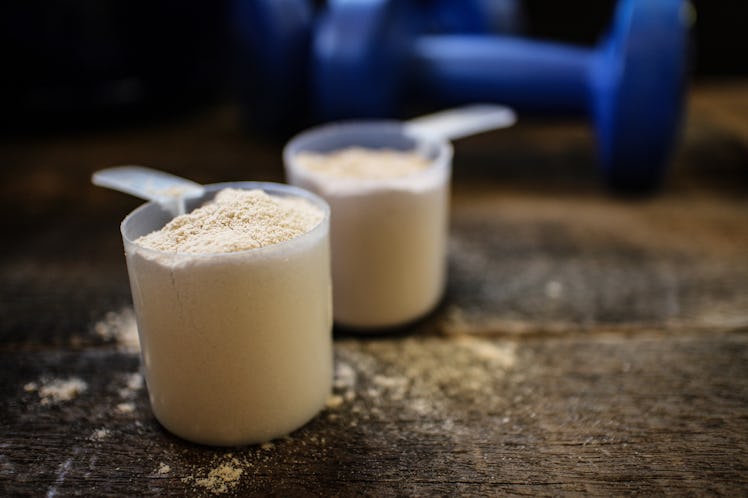Dry Scooping Pre-Workout Is The Latest Fitness Trend That Could Land You In The Hospital
Sorry, but downing a scoop of dry protein powder pre-workout is not going to help your gains.

Being into fitness is a good thing, but it’s easy to cross the line into viral fitness trends that hurt your health rather than help it. Enter: dry scooping, one of the latest fitness trends making the rounds on TikTok. Essentially, dry scooping involves eating a scoop of pre-workout powder or protein powder to boost energy before hitting the gym. Instead of diluting these powders and drinking the contents, fitness fanatics jumping on the trend are dumping the powder directly into their mouths and swallowing the powder dry — no water or milk included. So is dry scooping pre-workout bad for you?
Yes, dry scooping can have serious detrimental effects on your health. In one of the worst case scenarios, it can even land you in the hospital.
Does Dry Scooping Pre-Workout Have Any Benefits?
The reason why gym buffs dry scoop is to absorb pre-workout energy powder faster. And to this effect, dry scooping does work. Eating the powder dry does get it into your system quicker, allowing the user to feel the effects more rapidly, says Benedict Ifedi, M.D., a family and sports medicine physician with Memorial Hermann Medical Group in Texas.
However, fast absorption isn’t necessarily a good thing. Not only can rapid absorption of the ingredients found in pre-workout powder be dangerous (more on that in a minute), but these supplements don’t actually have the benefits that proponents claim they do.
When it comes to pre-workout energy powder, which often contains caffeine, there is some proven boost to anaerobic energy, which means it gives you more energy for short, high-intensity bursts of training. But when it comes to increasing your upper and lower body power, you won’t see much benefit.
Further, pre-workout powders are lacking long-term research — not only for efficacy, but also for safety. They’re unregulated and can even contain banned substances, such as anabolic steroids and harmful stimulants or hormones (1,3-dimethylamylamine or DMAA, which can lead to heart attacks, is one of the most widely publicized).
As for protein powder, research has found that protein intake has a similar effect both before and after workout. So there’s no need to hastily dry scoop before you exercise. A post-workout protein shake will work just as well.
Why Is Dry Scooping Pre-Workout Bad For You?
There are two main dangers of dry scooping. First, consuming dry powder itself can lead to choking or inhalation, which can cause aspiration pneumonia, Ifedi says. This condition occurs when a person inhales powder into the lungs, which is why labels say to dilute the supplements in a liquid before consumption.
Even if you avoid inhaling the powder, you aren’t in the clear health-wise. Pre-workout powders are also dangerous because of the amount of caffeine they contain. “Caffeine naturally [increases] mental alertness, mood, and performance,” Ifedi says. “A normal 8 oz cup of coffee contains about 95 mg of caffeine. Some research has shown a dry scoop of pre-workout can contain the caffeine equivalent of upwards to five cups of coffee.”
When your body ingests this much caffeine rapidly, Ifedi notes that it can lead to:
- increases in blood pressure,
- increases in heart rate,
- dangerous changes in heart rhythm,
- heart attack,
- stroke,
- and even death.
One 20-year-old woman learned the dangers of dry scooping the hard way when she was hospitalized for a heart attack after dry scooping before a workout. And caffeine overdoses, which could be caused by dry scooping, have caused at least 92 deaths in the past fifty years.
What About Pre-Workout Powder Taken the Right Way?
Just because dry scooping is dangerous doesn’t mean you have to ward off pre-workout powder forever. If you do use it, just be sure to dilute it.
Additionally, Ifedi recommends that kids under 18 avoid the supplement altogether. Adults should consult with a dietician, team athletic trainer, or physician prior to using a pre-workout supplement so they can ensure that their preferred brand doesn’t contain any hidden or banned ingredients.
The bottom line? Nutrition and exercise should involve more than the latest fitness trends (especially when it comes to supplements). Although we’re inclined to want to “hack” our routines, Ifedi notes that balance — seven to eight hours of sleep per night, rest days built into your exercise routine, and a balanced diet — is equally if not more important than supplementing before a workout to optimize fitness.
The basics work, so there’s no need to go to extremes — especially when they’re part of a toxic workout culture that puts maximizing your workout before your health.
This article was originally published on